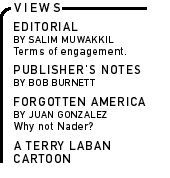 
|

|

|

|
| |
|
|
|
Working people today are confronting a political challenge that may be more far-reaching in its consequences than any in the more than two centuries of our republic's existence. An unprecedented flood of corporate campaign contributions has raised the stakes in federal elections to the point where few candidates for any office remain immune to its siren song. This massive outpouring of corporate cash is financing a relentless assault on our jobs, our rights as workers and the security of our families and communities. From NAFTA and GATT to the WTO and PNTR, multinational corporations and Wall Street financiers have concocted an alphabet soup of anti-worker legislation and job-destroying trade rules designed to level the cost of doing business to its lowest global denominator. As a result, workers around the world are suffering, human rights are under attack and the environment is at greater risk. All have gotten in the way of the drive to maximize profits by seeking the cheapest labor and the least taxation and regulation. Corporate bagmen roam the halls of Congress and the executive branch, corrupting Republicans and Democrats alike with their destructive agenda. When politicians of both major parties are marinated in corporate money, the greatest threat to working people's security comes not from right-wing zealots, but from our so-called friends, many of whom have double-crossed working families time and again. Now more than ever, issues are more important than party labels. And while Democratic control of both Congress and the White House remain desirable, it is largely because Republican control is so much worse. Some might say this analysis points to an endorsement of Ralph Nader for president. The United Steelworkers of America feel differently. More than most, our union's members have demonstrated a willingness to challenge the corporate agenda in all its forms, whether on the picket line, in the halls of Congress or on the streets of Seattle. And far more often than not, we have found ourselves working shoulder-to-shoulder with Ralph Nader, whether the issue was health and safety on the job, the ability of workers to organize, or opposition to job-destroying trade agreements. Yet by overwhelming margins, our membership supports the candidacy of Al Gore over that of any other candidate, not because the vice president represents the lesser of two evils, but because he consistently has supported working Americans throughout his political career. It was this outspoken and decades-long support for workers rights that first won Gore the Steelworkers' endorsement last October. If anything, the vice president has gotten stronger on the issues as time has passed. And for working Americans, the differences between Gore and George W. Bush are crucial: * Gore would ban the destructive use of permanent replacement workers in strikes. Bush would not. * Gore would champion reform of our nation's labor laws to make it possible for workers to organize without employer interference. George Bush would push for a national "right-to-work" law to make organizing even harder. * Gore would strengthen Social Security and Medicare, and push for universal access of all Americans to health care. Bush, on the other hand, supports risky privatization schemes that threaten seniors' security and presides over a state that ranks next to last in people with health care coverage. * Gore consistently has supported increases in the federal minimum wage, while Bush defends a state minimum wage in Texas that's nearly $2 per hour lower than the federal minimum. Absent his allegiance to the current administration's trade policies--which are no different than those of the past three administrations, Republican or Democrat--Al Gore has consistently supported working people's rights since his first election to Congress. He's even crisscrossed the country supporting the right to strike. But even on trade, there are crucial differences between Gore and Bush. In contrast to current trade policy, which the governor wholeheartedly supports, the vice president has promised to push global labor standards upward and integrate labor rights and environmental concerns into international trade agreements. While Nader's positions on workers rights, global trade and corporate accountability may be closer to some of labor's positions, the differences between Gore and Nader pale in comparison to the differences between Gore and Bush--with one crucial exception. Either Gore or Bush will win the election. Nader won't. If Bush wins the election, we can look forward at least four years of open season on workers and their unions, with frontal assaults on our ability to organize, participate on an equal basis in the political process and even govern our own organizations. A Gore administration, at the very least, would give American workers the room to build on the gains we've made over the past eight years. At best, we will find the kind of support for working families that we've sought for nearly 30 years. George Becker is international president of the United Steelworkers of America. Now read Kay McVay's response, "Nader is Best for Labor"
|

